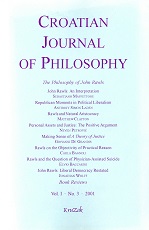Rawls on the Objectivityof Practical Reason
Rawls on the Objectivityof Practical Reason
Author(s): Carla BagnoliSubject(s): Philosophy
Published by: KruZak
Summary/Abstract: This article argues that Rawls’ history of ethics importantly contributes to theadvancement of ethical theory, in that it correctly situates Kantian constructivismas an alternative to both sentimentalism and rational Intuitionism, and calls attentionto the standards of objectivity in ethics. The author shows that by suggesting thatboth Intuitionist and Humean doctrines face the charge of heteronomy, Rawls appearsto adopt a Kantian conception of practical reason. Furthermore, Rawls followsKant in assuming that ethical objectivity can be vindicated only if the productiveand constructive powers of reason are acknowledged. The author accounts for thisassumption against the background of Kant’s moral psychology, and examinesIntuitionist and Humean rejoinders. Contrary to a common view, the author arguesthat because of its claims on the nature of moral agency and the sovereignty ofpractical reason, Kantian Constructivism sets the standards of ethical objectivityhigher than its alternatives, and is more ambitious and more demanding than therealist conception of objectivity.
Journal: Croatian Journal of Philosophy
- Issue Year: I/2001
- Issue No: 3
- Page Range: 307-329
- Page Count: 23
- Language: English
- Content File-PDF

